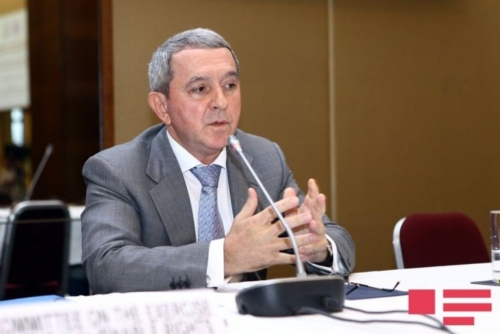Azerbaijan Positions Itself at the Forefront of Global Change at “Facing the New World Order” Forum
TDT | KSA
Email: mail@newsofbahrain.com
The international forum “Facing the New World Order”, hosted at ADA University and attended by Azerbaijani President Ilham Aliyev, was more than just another policy conference — it was a declaration of Azerbaijan’s active and growing role on the world stage. As global power dynamics evolve, Azerbaijan is stepping forward not as a passive observer, but as a proactive shaper of regional and international developments.
The forum gathered a distinguished lineup of politicians, diplomats, strategists, and academics, all eager to discuss the emerging world order and the realignments reshaping global politics. The event also reflected a larger shift: regions once defined by historical conflicts — such as the South Caucasus — are beginning to emerge as hubs of responsibility, decision-making, and leadership.
Azerbaijan’s Vision for Peace and Regional Cooperation
In his keynote speech, President Ilham Aliyev laid out a clear and compelling vision, not only addressing Azerbaijan’s path to peace with Armenia but offering a broader framework for regional cooperation and stability. He reaffirmed Azerbaijan’s commitment to normalizing relations with Armenia and sketched out the conditions for a lasting peace agreement.
Beyond the bilateral dialogue, Aliyev’s address highlighted Azerbaijan’s geopolitical strategy — one built on regional transformation, evolving security partnerships, and a clear-eyed response to the shifting global order. As conflicts like the war in Ukraine and disruptions to global energy and supply chains shake old systems, President Aliyev’s remarks emphasized a crucial question for smaller nations: Will they be passive subjects of global politics, or will they assert themselves as strategic actors?
Azerbaijan: A Key Regional Connector
Geographically straddling the Caspian and Black Seas, Azerbaijan has long been a bridge between East and West. In the past two decades, it has cemented its status as the South Caucasus’ principal energy and logistics hub. The Southern Gas Corridor, connecting the Caspian Sea to Southern Europe via the TANAP and TAP pipelines, plays an increasingly vital role in Europe’s energy independence, particularly in reducing reliance on Russian gas.
Azerbaijan’s capital, Baku, is now home to the largest seaport on the Caspian Sea, serving as a major gateway for trade between China and Europe. Beyond energy, Azerbaijan plays a strategic role in global trade routes such as the International North-South Transport Corridor and the Trans-Caspian Route, linking India, Central Asia, and Europe.
From Post-Conflict Recovery to Positive Peace
Since the 2020 liberation of Karabakh, Azerbaijan has embraced a model of reconstruction centered on the concept of “positive peace.” This approach extends beyond ending hostilities, aiming to create a lasting, stable, and institutional regional order.
At the forum, President Aliyev underscored Azerbaijan’s readiness for peace, placing the onus squarely on Armenia. “With respect to the peace agreement, the ball is in Armenia’s court,” he declared, signaling that Azerbaijan has fulfilled its commitments and that the delay now lies with Yerevan. He emphasized that Armenia’s occupation of Azerbaijani territories had obstructed the South Caucasus’ integration and that the region could only move forward through mutual recognition, cooperation, and respect for international law.
Aliyev also criticized Armenia’s economic miscalculations, pointing out how its aggressive policies and occupation had cut it off from regional transit routes and trade opportunities. “Armenia deprived itself from becoming a transit country for Azerbaijan's energy resources and transportation routes,” he noted, highlighting how peace and cooperation could transform Armenia’s future if it embraces a realistic and forward-looking approach.
Peace as a Path to Prosperity
President Aliyev’s address was not merely diplomatic — it was a roadmap for the future. Azerbaijan’s message to Armenia is clear: the path to economic growth and political stability lies in peaceful cooperation, not territorial disputes.
Should Armenia choose peace, the South Caucasus could enter a new era of integration. A peace treaty would unlock transformative opportunities for both nations, including the potential development of the Zangezur Corridor — a route that could reconnect Armenia to global trade networks stretching from the Persian Gulf to the Mediterranean and Caspian Seas.
A future rooted in cooperation would also reduce the need for military alliances, shifting the region’s focus toward economic collaboration and infrastructure development. Institutions such as a South Caucasus Security Council or Infrastructure Commission could emerge, creating a foundation for long-term regional security and prosperity.
A Strategic Hub in a Multipolar World
Historically viewed as a peripheral area in global affairs, Azerbaijan’s pragmatic and independent foreign policy has elevated its role as a key player in a multipolar world. Through strategic partnerships — particularly with Kazakhstan, Uzbekistan, and European Union nations such as Romania and Hungary — Azerbaijan is forging a multi-directional, cooperative model that transcends the traditional center-periphery dynamic.
Azerbaijan’s investments in energy, transport, and digital infrastructure underscore this transformation. In 2023 alone, the country exported over 8 billion cubic meters of natural gas to the European Union, and nearly 70% of the Trans-Caspian multimodal freight route passes through Azerbaijani territory. Major infrastructure projects, including the Alat Port and digital corridors, position Baku as both a reliable partner and a linchpin of Eurasian connectivity.
Embracing a New World Order
The Facing the New World Order forum made one thing clear: the age of a singular, universal global order is fading. Instead, nations like Azerbaijan are charting their own courses, building flexible alliances and regional partnerships tailored to their unique geopolitical circumstances.
Through dialogue, diplomacy, and bold vision, Azerbaijan is stepping forward as both a regional leader and a reliable global partner — ready to shape, not just adapt to, the emerging world order.
Related Posts

